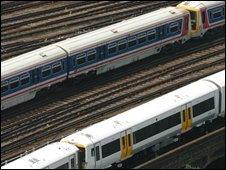Network Rail profits see sharp fall
- Published

Network Rail says more trains are running on time
Profits at Network Rail fell by nearly 75% over the past year but the company said a record number of trains were running on time.
Network Rail, which operates the UK's rail infrastructure, made pre-tax profits of £395m ($572m), down from more than £1.52bn last year.
The company receives most of its money from the taxpayer.
The fall in profits is due to a revaluation of its assets as well as a drop in revenue from train companies.
Part of it reflects higher investment in the network.
Its regulator, the Office of Rail Regulation (ORR) sets the returns Network Rail is allowed to make and orders reinvestment.
The ORR has described this year's as "mixed" and warned that bonus payments must reflect performance.
Last year, payments to its top executives totalled £1.2m despite shortcomings identified by the ORR and provoked strong criticism - although Network Rail's chief executive, Iain Coucher, did not take up his own bonus.
Any extra remuneration for this year will be announced later this month.
Changing priorities
Network Rail's current government funding runs from 2009 to 2014, and although the coalition government is keen to cut public spending it would have to reopen negotiations to do so.
Iain Coucher told BBC Radio 4's Today programme he was ready to talk to the government again if need be.
He said: "We will certainly talk to the government about their priorities if they have changed." But he added that he was not expecting any change to his budget.
Another source of income comes from the fees it charges its users, the train operating companies, such as Virgin and First Great Western to use its tracks.
Part of the fall in its profits was down to an ORR-enforced cut in these charges.
Network Rail said it had improved punctuality, with a record 91% of trains arriving on time.
Punctuality
However, the head of the Transport Salaried Staff Association (TSSA) rail union, Gerry Doherty, described Network Rail's claim of record punctuality as "poppycock".
He said the figure of 91% was only a record because British Rail did not announce national figures.
And said the largest region that did disclose performance, Southern Railway, regularly achieved 95% punctuality figures.
"Network Rail does not own one single train - it is a maintenance firm looking after track and signals. Punctuality is down to the private train operators who actually run the trains," Mr Doherty said.
He said the issue of punctuality should not be part of any bonus decision.
TSSA and another rail union, the RMT, are in dispute with Network Rail over plans to cut 1,500 maintenance and signallers' jobs.
Industrial action planned for last month was suspended after the company succeeded in getting a High Court injunction against it.